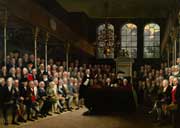
Edward Byron Nicholson
Rights of an Animal
「1879」 Edward Byron Nicholson, The Rights of an Animal, A New Essay in Ethics 「Google Books」(London, 1879).
In the history of thought the truth which is to-day’s laughing-stock becomes to-morrow’s doubt, the wisdom of the third day, and the child’s lesson of the fourth.
I do not claim to have found a new truth. Lawrence, Bentham, and Helps have each of them laid down the principle that feeling (by which I mean the power of feeling pleasure and pain) gives rights; and this principle was clear enough to any one who would look straight at it and into it. But that is just what the transmitted prejudices of thousands of years, and the fear of being laughed at which works so strongly on nine men in every ten, hindered most people from doing. And so it comes to pass that the mention of the rights of animals in many a drawing-room of to-day might, I dare say, cause as much mirth as would once have been caused by the proposals to do away with slavery and to give the people votes.
THE
RIGHTS OF AN ANIMAL:
A NEW ESSAY IN ETHICS.
BY
EDWARD BYRON NICHOLSON, M.A.,
LATE SCHOLAR OF TRINITY COLLEGE, OXFORD;
PRINCIPAL LIBRARIAN AND SUPERINTENDENT OF THE LONDON INSTITUTION;
Author of “The Christ-Child, and other Poems.’
WITH A REPRINT OF
PART OF JOHN LAWRENCE’S CHAPTERS
‘ON THE RIGHTS OF BEASTS,’
‘ON THE PHILOSOPHY OF SPORTS,’ AND
‘THE ANIMAL-QUESTION.’
LONDON :
C. KEGAN PAUL & CO., 1, PATERNOSTER SQUARE.
1879.
“By a recurrence to principles it will appear that life, intelligence, and feeling necessarily imply rights. Justice, in which are included mercy or compassion, obviously refers to sense and feeling. Now is the essence of justice divisible? Can there be one kind of justice for men, and another for brutes? Or is feeling in them a different thing to what it is in ourselves? Is not a beast produced by the same rule and in the same order of generation with ourselves? Is not his body nourished by the same food, hurt by the same injuries; his mind actuated by the same passions and affections which animate the human breast; and does not he also at last mingle his dust with ours and in like manner surrender up the vital spark to the aggregate or fountain of intelligence? Is this spark, or soul, to perish because it chanced to belong to a beast? Is it to become annihilate? Tell me, learned philosophers, how that may possibly happen.”—JOHN LAWRENCE.
“Milverton…I distinctly hold that every living creature has its rights, and that justice, in the highest form, may be applied to it…
Ellesmere… Every animal has its rights, according to Milverton. Why stop there? Every reptile then: every insect ? Do you admit that, you Brahminical personage?
Milverton. Certainly. You may make me ridiculous, or, at least, try to do so; but you shall not make me inconsistent. Look there: you see, at this moment, in front of the open window, a number of flying creatures…whirling about in a mazy dance, and, as far as we can judge, enjoying themselves very much, and doing us no harm. They are not even touching any of that ‘property’ which the lawyers love so well. If you were to kill any of them at this moment, I think it would not merely be cruelty, but an invasion of right—an illegal transaction.
Sir Arthur. I think Milverton is justified in this assertion. You have no right to attack those creatures.”—SIR ARTHUR HELPS.
OF THE MANY MEN, DEAD AND LIVING,
WHO HAVE PLEADED THE CAUSE OF THE HELPLESS AND DUMB,
I THINK THERE IS NONE TO WHOM I OUGHT RATHER
TO DEDICATE THIS LITTLE BOOK THAN TO
JOHN LAWRENCE
AND
SIR ARTHUR HELPS.
FOREWORDS.
THE first five chapters of this essay were thought out in a summer’s holiday four years ago and were written almost at once. But it is much easier to find and lay down abstract principles than to see how far they can be pushed unflinchingly and where the circumstances of this world force us to allow exceptions in practice. I do not claim to see this now with the fullest clearness, and I saw it very much less clearly four years ago. And, since up to October, 1877, I had no chance to work my puzzles out, the ending chapter was not written till then. Belike it would not have been written at all but that the sheer feeling of duty which drove me to begin my essay drove me also to find time somehow to end it. Doubts as to the readiness of the public mind for such a book have stood in the way of its publication, but the kindness of some hundreds of ladies and gentlemen, whom I heartily thank, in ordering copies before-hand has now saved me from the fear of any very heavy loss.
I do not claim to have found a new truth. Lawrence, Bentham, and Helps have each of them laid down the principle that feeling (by which I mean the power of feeling pleasure and pain) gives rights; and this principle was clear enough to any one who would look straight at it and into it. But that is just what the transmitted prejudices of thousands of years, and the fear of being laughed at which works so strongly on nine men in every ten, hindered most people from doing. And so it comes to pass that the mention of the rights of animals in many a drawing-room of to-day might, I dare say, cause as much mirth as would once have been caused by the proposals to do away with slavery and to give the people votes. What I do claim to have done is to have started from a still earlier principle in morals, the first principle indeed; to have deduced from that the principle of Lawrence, Bentham, and Helps; to have strengthened this latter principle (though in truth it did not need strengthening) by an argument from moral evolution; to have put and answered the objections to it more systematically; to have defined the limitations which necessity sets to its observance in practice; and by means of examples falling within or without these limitations to have given some of the rough heads of a working code of duty towards animals.
My first two chapters bear the plain stamp of Herbert Spencer’s Social Statics, but I know no other theory of right and wrong (except ‘might is right’) which would not equally allow a proof of animal-rights. As for the rest of the essay, I cannot mind having borrowed a single thought : but it may be that here and there that good and charming book of Sir Arthur Helps, Some Talk about Animals and their Masters, has fixed in my mind something which I might else have forgotten.
As to the last chapter, ‘Limitations in Practice,’ it must be clearly understood that no general enquiry into the relations between man and the animal kingdom was foremeant: that would have taken up so much of my scanty leisure that I must have put off till I know not when the publication of principles which, once settled, can be applied slowly and surely to every detail of our behaviour to animals.
I must, by the way, beg pardon for using ‘animals’ unscientifically for ‘lower animals,’ as if we ourselves were not animals at all. ‘Lower animals’ seemed too cumbersome: it is a pity that we have lost the old meaning of our word ‘deer,’ the German ‘thiere.’
And I may as well save any one the trouble of picking my style to pieces, by saying that I have no style worth speaking of. In my schoolboy-days I gathered from books and newspapers that there were two main rules to follow in ‘composition’—firstly, always to choose a Romance word before an English word, and a Latin or Greek word before either; secondly, to shun ‘tautology.’ And in this style of writing ‘English’ I soon gained such very fair skill that most of the people of England would have been altogether unable to understand anything which I wrote. But in an evil day for my peace of mind I fell to reading old English books, and soon after them the works of William Morris and Edward A. Freeman, and at last it dawned on me that I had all along been writing the very worst of styles instead of the best; that indeed a Romance word ought always to be chosen before a Greek or Latin word, and an English word before either; and that if a man wanted to ‘say’ three things he needs not after all ‘observe’ the second and ‘remark’ the third. But alas ! to write good English one wants either the time, which I have not yet found, to learn it, or a ¹Wordbook for English Writing (not a Dictionary of English Composition) with the Greek, Latin, and Romance words put first and the English of them after. And, beyond this, I have often been afraid to write a word or two of English when it was at the point of my pen, for fear that my readers’ minds should be drawn away from the thought by the seeming oddness of the words, and also for fear that they should be ashamed to acknowledge the thought in the face of the world because of the old and strange cut of the thought’s clothing. So that I have gone no further in trying to write something like English than might be done without risking the end for which I print this essay, and from this cause and the former put together it comes to pass that my style is ‘neither fish nor flesh. nor,’ I fear, good red herring.’
I have reprinted at the end of my essay the greater part of the chapter ‘On the Rights of Beasts’ in a work called A Philosophical Treatise on Horses, and on the Moral Duties of Man towards the Brute Creation, by John Lawrence the date of the 2nd ed. from which I copy it being 1802; and I have added extracts from other parts of his writings. I came across Lawrence in classifying the books in the library of this Institution and was at once struck with his freshness and clearness of thought, his warmth of heart, and his force of expression. What he has written on the subject would be noteworthy enough if written in 1879 : for 1802 it is nothing less than wonderful, and I know no other writer of his day save Bentham who can be spoken of in the same breath with him. The least I can do for this lettered farmer (nowadays so little cared for or even known that Allibone does not think his works worth naming) is to bring him back from the dead and let him speak once more to the world to which he spoke vainly —if indeed in vain. If indeed in vain: for it may be that much of that seed which first struggled above English ground in 1822, and which, growing steadily ever since, will some day spread its thick shelter over all the birds of the air, the beasts of the field, and every living thing, was sown by the hand of John Lawrence.
I might have quoted throughout this essay many other men far more famous than Lawrence, and of eloquence sometimes equal, but that I would not seem to throw great names into my side of the scales. Had I done so I should have run less chance of being laughed at : but I am not careful on that account, knowing that in the history of thought the truth which is to-day’s laughing-stock becomes to-morrow’s doubt, the wisdom of the third day, and the child’s lesson of the fourth.
London Institution.
CONTENTS.
Universality of conscience. Its origin disputed, but immaterial to the question before us. Its imperfections and inequalities do not overthrow its authority : their explanation. Conscience in its highest development bids men do what is for the happiness of their fellow-creatures. Additional sanction to this aim on the theory of a Creator …
…1
What is happiness ? Herbert Spencer’s definition accepted. Involves freedom of action for each individual up to the point where his freedom would trench upon that of others. Hence the rights of life and personal liberty. The argument necessitates our allowing the same rights, in the abstract, to the lower animals …
…6
The conscience of most civilized people enjoins them to treat animals kindly, that is, to seek the happiness of animals as well as of men. Inconsistencies of conduct due to the yet imperfect development of this side of conscience. Quickness of such development in England during the present century. Entire want of legal protection to animals before 1822. Sir R. Knyvet Wilson’s sketch of legislation since 1822 quoted and corrected. Still later legislation in 1876 has not kept up with this development: the Saturday Review’s call for a more comprehensive law. The legislation of this century is either a tacit admission that animals possess rights, or a gross violation of the rights of men over their own property. Other manifestations of the same development of conscience. Further argument on the hypothesis of a benevolent Creator.
Notes.—Extracts from the Parliamentary Debates of 1822. Insufficiency of Martin’s Act : decisions of police-magistrates. Extract from Parliamentary Debates of 1835 …
… 8
The first objection—that ‘animals have no reason.’ Is bad, because (1) irrelevant : analogy of the idiot (2) untrue : definitions of instinct and reason : Büchner’s view of the animal-mind : the Rev. J. G. Wood’s view. The power of animals to understand human speech : the future study of animals’ speech.
Note.—Bacon, Hartley, Darwin, and Braubach on the ‘religious’ sentiment in animals …
… 19
The second objection—that ‘animals have no soul.’ Is bad, because (1) irrelevant, (2) it tells the other way, (3) unprovable. The mode of argument involves the denial of rights to a large part of mankind. The objection also appears incompatible with the hypothesis of a benevolent Creator …
… 31
The third objection—that ‘animals have no feeling ‘ (the Neo-Cartesian theory of animal-automatism). Distinction between this and the theory of Des Cartes himself. Objection bad, because (1) it is founded on a false premiss, (2) contrary to analogy, (3) contrary to our knowledge of the phenomena of evolution …
… 34
The abstract theory of animals’ rights unworkable, in this world, the circumstances of which impose (1.) Limitations in the case of noxious animals. The noxiousness of a given animal varies according to its habitat and its numbers. (2.) Limitations due to the struggle for food. The ‘law of necessity :’ its moral justification. Overrides to a great extent the rights of most land-animals. The customary modes in which man applies this law :— (a.) By checking breeding. Its only fault. (b.) By allowing breeding and keeping the offspring for man’s use or pleasure. Why preferable. Work in reason adds pleasure to the life of animals as well as of men. The animal retains its rights of rest and recreation. The duty of kindness and ‘courtesy’ to animals. Confinement of pets often unjustifiable. Confinement of animals in zoological gardens and zoölogists’ vivaries : different degrees of justification. Confinement of animals in wandering shows. (c.) By allowing breeding and killing the offspring for food, instruction, or pleasure. Apology for foxhunting by one of Mr. Freeman’s critics: ridiculed as a fallacy; otherwise stated must be held to afford a technical justification. Inapplicable to water-animals : is there any other justification for their slaughter? Inapplicable also to a large class of land-animals. Slaughter of food-producing animals perhaps needlessly large : value of vegetables underrated. Early slaughter of food-producing animals. Conditions under which food-producing animals should be slaughtered: present neglect of those conditions. The killing of animals as zoölogical specimens in many cases indefensible : the uselessness and bad tendency of encouraging boys to collect them. Vivisection: failure of the usual scientific defense : on what classes of animals alone, and under what conditions alone, vivisection is morally justifiable. Field-sports: technically defensible, but harmful to humane feelings. The neglect of charity to animals; some channels for its exercise.
Notes.—Sir Arthur Helps on ‘courtesy’ to animals. Kindness to animals too seldom preached from the pulpit. Pets bred from captive parents. Confinement of native birds. The slaughter of birds of paradise. ‘Robin-trimmings.’ Dr. Edward Smith on animal and vegetable food. The Pall Mall Gazette on over-consumption of meat. The use of oxen for draught. The social aspect of the food-question. A few words to schoolboys. Lawrence on vivisection. Vivisection and theft. Prof. Stanley Jevons on ‘sportsman’s humanity.’ ‘Why are foxhunters such humane men ?’ …
… 41
APPENDIX.
Sketch of the Life and Character of John Lawrence
… 71
Lawrence “On the Rights of Beasts.”
Notes.—The discussion on the bills against bull-baiting in 1800 and 1802. Prof. Stanley Jevons’s view of the putting down of bull-baiting …
… 78
Lawrence “On the Philosophy of Sports.” …
… 112
Lawrence on “The Animal-Question.”.”
Notes.—Sketch of Erskine’s Parliamentary efforts on behalf of animals. The question of law whether Martin’s Act protected bulls …
… 117
125
BY THE SAME AUTHOR.
Crown 8vo, cloth, 4s. 6d.
THE CHRIST-CHILD,
AND OTHER POEMS.
“Very bad verse—artificial and affected in language, crude and obscure in idea. . . . Persons thus christened may be predestined to make themselves ridiculous. . . His verses are rubbish, pure and simple, from beginning to end.”—World.
“No piece which does not possess some grace or tenderness, or touch of fancy or of humour. . . . Proves the presence amongst us of a man of true poetical feeling and culture. “—Academy.
“Among the writers of verse he would have an unusual prospect of distinction. Whatever style Mr. Nicholson chooses to employ he uses with grace and skill.”—Spectator.
“Far more originality is shown in Mr. Nicholson’s ‘The Christ-Child.’…His preface is a model of good sense. We think that he has very fairly estimated his own powers. He seems to be quite aware, what the majority of poets are not aware of, that, to take any rank as a poet in these days, life must be dedicated to the Muses.”—Westminster Review.
Will be published in the Autumn.
Denny 8vo, cloth, 9s. 6d.
THE GOSPEL ACCORDING TO THE HEBREWS
ITS FRAGMENTS TRANSLATED AND ANNOTATED,
With a Critical Analysis of the External and Internal Evidence
relating to it.
Will be published in the Winter.
Derry 8vo, cloth.
A COMMENTARY ON
THE GOSPEL ACCORDING TO MATTHEW
(Undoctrinal and unhomiletic, but meant to be in matters of illustration, translation, and textual criticism more complete than any existing English Commentary).
C. KEGAN PAUL & CO., 1, PATERNOSTER SQUARE, LONDON.




